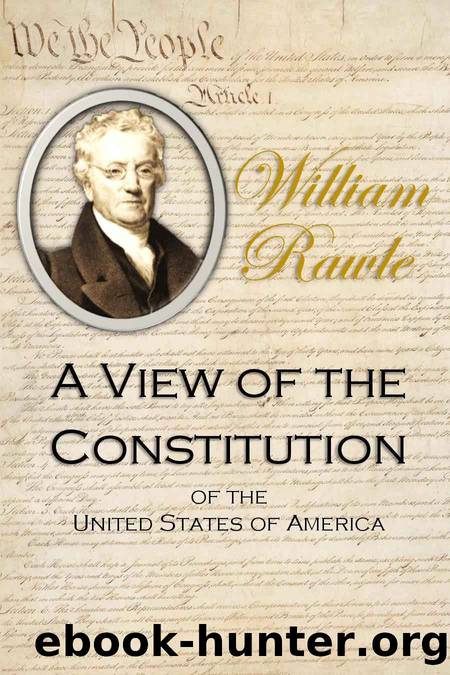A View of the Constitution of the United States of America (1829) by William Rawle

Author:William Rawle [Rawle, William]
Language: eng
Format: azw3
Published: 2018-08-18T00:00:00+00:00
CHAPTER XIV. OF THE APPOINTMENT TO OFFICES.
In addition to the power over the army, navy, and militia, already noticed, the president has a qualified power of appointing the executive and judicial officers. The former of these are held during his pleasure; the latter during good behaviour. In respect to both, the commissions are granted by the president, but they specify that it is by and with the advice and consent of the senate. It was deemed expedient that the approbation of the senate should be given, unless a vacancy happened during its recess, in which case commissions are granted which expire at the end of the next session.
It may, however, be questioned, whether this restraint on the power of the president fully corresponds with the confidence which is otherwise reposed in him, and whether it does not in some degree affect the responsibility to public opinion which would accompany an unlimited power of appointments.
If it were left entirely to himself to select such agents as he might deem qualified for public duties, he would of course be scrupulous in his choice; but if a senate, either actuated by party motives, or for want of information of the fitness of the individual, rejects the nomination, not only may the public interests suffer in the immediate case, but the president be impelled to inadequate substitutions. It is true, that the converse of this proposition may also be admitted. Improper nominations, proceeding from personal or party influence, may be properly rejected by a virtuous and inflexible senate; but in the latter case, if it ever should be our misfortune to have a man so actuated, in possession of this high office, we may see him immediately after the rising of the senate, dismiss the incumbent, or in case of their rejecting one nomination, withholding another, and availing himself of the power to appoint during the recess. It would, therefore, appear upon the whole, that with the possibility of an evasion which would render the constitutional provision so entirely nugatory, it would have been more beneficial to have left this power in the president without restraint, and the more so, as the consent of the senate is not required for the dismission of the officer.
It would be improper to pass over the construction given by the senate to the power of appointing during their recess. It has been held by that venerable body, that if new offices are created by congress, the president cannot, after the adjournment of the senate, make appointments to fill them. The vacancies do not happen during the recess of the senate.
The text is not very explicit as to the officers whose appointments require the consent of the senate: it enumerates ambassadors, other public ministers, and consuls, judges of the supreme court, and all other officers of the United States, whose appointments are not therein otherwise provided for, and which shall be established by law; but the congress may by law vest the appointment of such inferior officers as they think proper in the president alone, in the courts of law, or in the heads of departments.
Download
This site does not store any files on its server. We only index and link to content provided by other sites. Please contact the content providers to delete copyright contents if any and email us, we'll remove relevant links or contents immediately.
The Secret History by Donna Tartt(16606)
The Social Justice Warrior Handbook by Lisa De Pasquale(11485)
Thirteen Reasons Why by Jay Asher(7780)
This Is How You Lose Her by Junot Diaz(5753)
Weapons of Math Destruction by Cathy O'Neil(5029)
Zero to One by Peter Thiel(4816)
The Myth of the Strong Leader by Archie Brown(4785)
Promise Me, Dad by Joe Biden(4440)
Stone's Rules by Roger Stone(4412)
Beartown by Fredrik Backman(4403)
How Democracies Die by Steven Levitsky & Daniel Ziblatt(4392)
The Fire Next Time by James Baldwin(4336)
100 Deadly Skills by Clint Emerson(4070)
A Higher Loyalty: Truth, Lies, and Leadership by James Comey(4024)
Rise and Kill First by Ronen Bergman(4008)
The David Icke Guide to the Global Conspiracy (and how to end it) by David Icke(3875)
The Farm by Tom Rob Smith(3869)
Secrecy World by Jake Bernstein(3773)
The Doomsday Machine by Daniel Ellsberg(3725)
